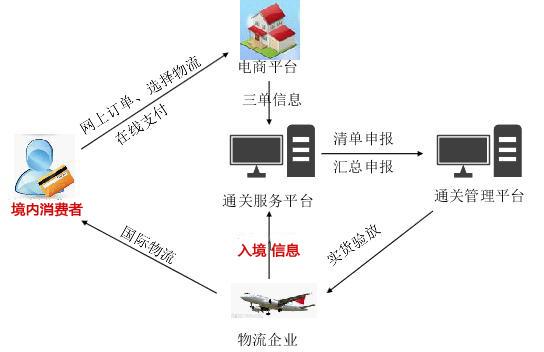 |
|
 |
|
| home > logistics |
|
 |
| storage | transport | cold chain | big data | import and export | EC | solution |
| EC |
跨境电子商务是基于网络发展起来的,网络空间相对于物理空间来说是一个新空间,是一个由网址和密码组成的虚拟但客观存在的世界。网络空间独特的价值标准和行为模式深刻地影响着跨境电子商务,使其不同于传统的交易方式而呈现出自己的特点。 跨国电子商务具有如下特征(基于网络空间的分析):Transnational e-commerce has the following characteristics (analysis based on cyberspace): (1) Global Forum The network is a media without boundaries, with global and non-centralized characteristics. Cross-border e-commerce, which is dependent on the network, also has the characteristics of globality and non-centralization. Comparing with the traditional transaction mode, an important feature of E-commerce is that it is a kind of borderless transaction, losing the geographical factors of traditional exchanges. Internet users can submit products, especially high value-added products and services, to the market without considering crossing national boundaries. The positive impact of the global characteristics of the network is to maximize the sharing of information, while the negative impact is that users must face risks arising from cultural, political and legal differences. Anyone who possesses certain technical means can let information enter the network at any time and anywhere and conduct transactions with each other. In its financial report, the U.S. Treasury pointed out that taxing e-commerce activities based on global networks is difficult because: e-commerce is based on virtual computer space, which loses the geographical factors of traditional transaction modes; manufacturers in e-commerce tend to hide their residences. Consumers are indifferent to the manufacturer's residence. For example, a small Irish online company can sell its products and services through the Internet through a web page that can be clicked and viewed by consumers all over the world, as long as consumers have access to the Internet. It is difficult to define in which country the transaction took place. The development of such remote transactions has created many difficulties for tax authorities. Tax power can only be strictly implemented within a country. This characteristic of the network brings difficulties for tax authorities to exercise tax jurisdiction over online transactions beyond a country. And the Internet sometimes acts as a proxy intermediary. In the traditional trading mode, there is often a need for a tangible sales outlet, for example, to sell books to readers through bookstores, while online bookstores can directly complete the entire transaction instead of bookstores. The problem is that tax authorities often rely on these sales outlets to obtain the basic information needed for tax collection, withholding and withholding income tax, etc. Without these outlets, the exercise of tax power will also be difficult.
(2) Invisibility The development of network makes the transmission of digital products and services prevailing. Digital transmission is carried out through different types of media, such as data, sound and image, which are concentrated in the global network environment. These media appear in the form of computer data code in the network, and therefore are invisible. Taking the transmission of e-mail information as an example, this information is first decomposed into millions of packets by the server, then transmitted to a destination server through different network paths according to TCP/IP protocol and re-organized and forwarded to the recipient. The whole process is completed instantaneously in the network. E-commerce is a special form of digital transmission activities. Its invisibility makes it difficult for tax authorities to control and check the trading activities of sellers. The transaction records faced by tax authorities are all in the form of data codes, which makes it impossible for tax inspectors to accurately calculate the sales and profit gains, thus making it difficult for tax authorities to control and inspect the trading activities of sellers. It brings difficulties to taxation. Digital products and services based on the characteristics of digital transmission activities must also have invisibility. Traditional transactions mainly focus on physical transactions, while in e-commerce, intangible products can replace physical objects as the object of transactions. Take books as an example, traditional paper books, whose typesetting, printing, sale and purchase are regarded as the production and sale of products. However, in e-commerce transactions, consumers can use the knowledge and information in books as long as they buy data rights online. But how to define the nature of the transaction, how to supervise, how to levy taxes and other issues have brought new topics to the tax and legal departments. (3) Anonymity Because of the non-centralization and global characteristics of cross-border e-commerce, it is difficult to identify the identity of e-commerce users and their geographical location. Consumers of online transactions often do not show their real identity and their geographical location. It is important that this does not affect the conduct of transactions at all, and the anonymity of the network allows consumers to do so. In virtual society, the convenience of concealing identity quickly leads to the asymmetry of freedom and responsibility. People here can enjoy the greatest freedom, but only assume the smallest responsibility, or even simply evade responsibility. Obviously, this has caused trouble to tax authorities. Tax authorities can not identify the identity and geographical location of online traders who should pay taxes, and can not know the transaction situation and tax payable amount of taxpayers, let alone audit and verification. This part of the transaction and taxpayers are invisible in the vision of the tax authorities, which is fatal to the tax authorities. Take eBay as an example. eBay is an online auction company in the United States that allows individuals and businesses to auction anything. So far eBay has 150 million users and auction tens of thousands of items every day, with a total turnover of more than $80 billion. The anonymity of e-commerce transactions leads to the deterioration of tax evasion. The development of the network reduces the cost of tax evasion and makes tax evasion in e-commerce easier. The anonymity of e-commerce transactions makes it possible for taxpayers to use online financial institutions in tax havens to evade tax supervision. The widespread use of electronic money and the "complete tax protection" provided by some online banks in tax havens on the Internet enable taxpayers to directly remit their investment income from all over the world to online banks in tax havens, thus avoiding income tax payable. In its largest audit survey, the IRS found that a large number of resident taxpayers hid a large amount of taxable income through financial institutions in offshore tax havens. The U.S. government estimates that about $3 trillion of funds are hidden in tax havens because of the "full tax protection" of online banks in tax havens. (4) Immediateness For networks, the speed of transmission is independent of geographical distance. Traditionally, there are different time lags between sending and receiving information, such as letters, telegrams, faxes and so on. The information exchange in e-commerce, regardless of the distance between real time and space, is almost the same as the information sent by one side and received by the other side, just like face-to-face conversation in life. Some digital products (such as audio-visual products, software, etc.) can also be settled immediately. Orders, payments and deliveries can be completed in an instant. The instantaneity of e-commerce transaction improves the efficiency of people's communication and transaction, eliminates the intermediary link in traditional transaction, but also hides the legal crisis. In the field of taxation, the instantaneity of e-commerce transactions often leads to the arbitrariness of transaction activities, and the transaction activities of e-commerce subjects may start, terminate and change at any time, which makes it difficult for tax authorities to grasp the specific transaction situation of both sides of the transaction, and not only makes it difficult for tax authorities to control the withholding of the source of tax revenue. Means failure, and objectively contributed to the arbitrariness of taxpayers'non-compliance with the tax law, coupled with the serious lagging effect of modern tax collection and management technology in the tax field, has made tax administration by law pale. (5) Paperless E-commerce mainly adopts paperless operation, which is the main feature of e-commerce transactions. In electronic commerce, computer communication records replace a series of paper transaction documents. Users send or receive electronic information. Because electronic information exists and transmits in the form of bits, the whole process of sending and receiving information is paperless. The positive impact of paperless is that the information transmission is free from the restriction of paper, but because many of the traditional laws are based on the regulation of "paper transaction", paperless brings a certain degree of legal confusion. E-commerce intercepts written contracts and settlement bills in traditional trade with digital contracts and digital time, which weakens the ability of tax authorities to obtain transnational taxpayers'business status and financial information, and other confidentiality measures adopted by e-commerce will also increase the difficulty for tax authorities to master taxpayers' financial information. In some cases, the declaration amount of transnational taxpayers will be greatly reduced, and the amount of taxable income and tax collected will be less than the actual amount, thus causing the loss of international tax revenue of the taxing countries. For example, stamp tax, one of the traditional taxes levied by countries all over the world, is levied on the written documents provided by the parties to the transaction. The link of taxation is the establishment or completion of various legal contracts and vouchers. In the case of paperless online transactions, the form of material contracts and vouchers no longer exists, so stamp tax is imposed. The contract and certificate decals (i.e. the payment of stamp duty) can not be started.
(6) Rapid Evolution Internet is a new thing. At present, it is still in its infancy. The future development of network facilities and corresponding software protocols is uncertain. But the problem that tax law makers must consider is that the Internet, like other newborns, will continue to evolve at an unprecedented rate and in unpredictable ways. E-commerce activities based on the Internet are also in the process of rapid change. In just a few decades, e-commerce has experienced the process from EDI to the rise of e-commerce retail industry, and digital products and services are innovative, constantly changing human life. In general, in order to maintain social stability, countries will pay attention to maintaining the continuity and stability of the law, tax law is no exception. This will lead to the contradiction between the rapid development of the network and the lagging of tax laws and regulations. It is a difficult problem in the field of Taxation how to incorporate the Internet transaction which is developing and changing every minute into the norm of tax law. The development of the network has brought new challenges to tax authorities. The tax policy makers and tax law legislatures should pay close attention to the development of the network and take this factor into full consideration when formulating tax policies and tax law norms. Transnational e-commerce has many characteristics different from traditional trade mode, but the traditional tax system is produced under the traditional trade mode, which will inevitably lead to many loopholes in e-commerce trade. The network has a profound impact on human society, but also brought unprecedented impact and challenges to tax laws and regulations. |
|
|



